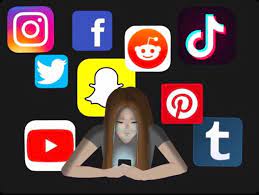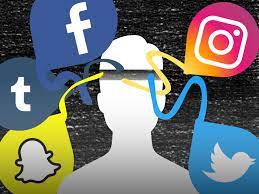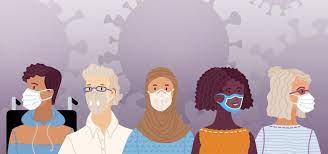Social media has become an integral part of many people’s daily lives, with billions of users around the world. While social media on mental health can have positive impacts, such as providing a sense of community and social support, there is increasing concern about its effects. Here we will examine the impact of social media on mental health, both good and bad.
The Good: Positive Impact of Social Media on Mental Health
There are positive impact of social media on mental health in several ways. For example, social media can provide a sense of community and social support, particularly for those who may not have access to such support in their offline lives. Social media can also be a source of inspiration and motivation, with users sharing their personal stories of overcoming challenges and achieving success.
In addition, social media can be a platform for raising awareness about mental health issues and reducing stigma surrounding mental illness. Many mental health organizations and advocates use social media to spread messages of hope and support, and to connect people with resources and services.

The Bad: Negative Impact of Social Media on Mental Health
While social media can have positive impacts, it can also have negative effects on mental health. One of the most significant concerns is cyberbullying, with social media providing a platform for people to harass and intimidate others. Cyberbullying can have devastating impacts on mental health, leading to anxiety, depression, and even suicide.
Another concern is social comparison, with social media often portraying an idealized version of people’s lives. This can lead to feelings of inadequacy and low self-esteem, particularly among young people. In addition, social media can be addictive, with users feeling compelled to check their accounts and engage with others constantly.
The Ugly: How Social Media Can Fuel Mental Health Crises
In addition to the bad effects, social media can also fuel mental health crises. For example, social media can spread misinformation about mental health issues, leading people to avoid seeking help or pursuing treatment. Social media can also be a source of triggering content, such as graphic images or posts about suicide, which can exacerbate mental health issues in vulnerable individuals.
Mitigating the Negative Effects of Social Media on Mental Health
While social media can have negative effects on mental health, there are strategies for mitigating these effects.
- Taking breaks from social media can help reduce feelings of anxiety and depression, as well as prevent addiction.
- Setting boundaries around social media use, such as limiting the amount of time spent on it each day, can also be helpful.
- Seeking professional help, such as therapy or counseling, can also be beneficial for those experiencing mental health issues related to social media use.

Role of Social Media Platforms in Promoting Mental Health
Social media platforms have a responsibility to promote mental health and well-being among their users. This can be achieved through a variety of measures, such as:
- Providing resources for mental health support and connecting users with mental health professionals.
- Social media platforms can also implement policies to prevent cyberbullying and the spread of harmful misinformation related to mental health.
- Social media platforms can work to promote positive and accurate portrayals of mental health issues, reducing stigma and increasing awareness.
- It is important for social media platforms to prioritize the mental health of their users and to take proactive steps to mitigate the negative effects of social media on mental health.
How Social Media can Exacerbate Existing Mental Health Conditions
Social media can make existing mental health problems worse. If someone already has anxiety, they may feel even more anxious when they see upsetting news or negative comments on social media.
People with depression may feel worse when they compare their lives to others’ idealized versions on social media. It is important for people with mental health problems to be careful when using social media and get help from mental health professionals if they need it.
Research on the Impact of Social Media on Mental Health
While there is growing concerned about the impact of social media on mental health, more research is needed to fully understand the relationship between the two. Studies have produced conflicting results, with some suggesting that social media use is associated with increased mental health problems while others find no significant association.
Additionally, most studies have focused on young people, leaving unanswered questions about the impact of social media on mental health in other age groups.
Further research is needed to better understand the mechanisms through which social media affects mental health and to identify strategies for promoting positive outcomes. With more research, we can develop a better understanding of how to harness the potential benefits of social media while minimizing its negative effects on mental health.
Potential for Social Media to be Used as a Tool for Mental Health Interventions
Despite the potential negative effects of social media on mental health, there is also potential for social media to be used as a tool for mental health interventions.
- Mental health professionals and organizations can use social media to reach a broader audience and provide support and resources to those in need.
- Social media can also be used to promote self-care and mental health awareness, providing users with helpful tips and strategies for maintaining good mental health.
- Social media platforms can implement features to help users identify and address their own mental health needs, such as resources for seeking professional help or tools for tracking mental health symptoms.
- While there are challenges to using social media for mental health interventions, such as concerns about privacy and confidentiality, there is potential for social media to be an effective and accessible tool for promoting mental health and well-being.
Social media can contribute to the development of mental health disorders, particularly among young people. Studies have found that excessive social media use is associated with higher rates of anxiety, depression, and other mental health disorders.
Tips on How to Make Mental Health Better While Using Social Media
- Set limits on social media use
- Be mindful of the content you consume and engage with
- Practice self-care regularly
- Engage in positive social interactions on social media
- Seek support from mental health professionals or online communities
- Take breaks from social media when needed
- Use social media platforms that prioritize mental health and well-being
- Monitor your mental health symptoms and seek help if needed
- Focus on real-life relationships and experiences outside of social media
- Use social media to promote positive mental health messages and awareness
Final Thought
Social media can have both positive and negative impacts on mental health. While social media can provide a sense of community and social support, it can also be a source of cyberbullying, social comparison, and addiction. To mitigate the negative effects of social media on mental health, it is important to take breaks from social media, set boundaries around its use, and seek professional help if needed.



0 Comments